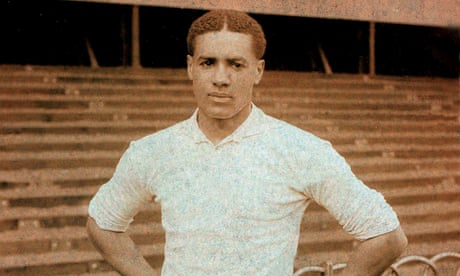https://www.theguardian.com/world/2...officer?utm_source=pocket-newtab-global-en-GB
A historian believes he may have uncovered clues about where Britain’s first black army officer was laid to rest.
Walter Tull served in the first world war as a second lieutenant, leading men into battle at a time when the army forbade a person of non-European descent becoming an officer.
As well as being one of the most celebrated black British soldiers of the war, Tull was also one of the first black professional football players in England, playing for Tottenham Hotspur and later Northampton Town while overcoming racial discrimination.
He died aged 29 while leading an attack during the second Battle of the Somme on the Western Front on 25 March 1918.
Historic accounts of the event describe how Tull’s friend Pte Thomas Billingham, a fellow footballer and goalkeeper for Leicester Fosse, saw him killed and tried to retrieve his body so he could have a proper burial.
Despite the best efforts of his men, Tull’s body was never recovered and his family believed he lay somewhere in a field in the Somme.
However, research by the military historian Andy Robertshaw points to unmarked graves at Heninel-Croisilles Road cemetery in northern France where Tull may have been buried.
Tull’s grandnephew Edward Finlayson, from Edinburgh, said it was possible he had been buried, among others, by the Germans when the ground was lost to enemy forces.
“Andy’s research and his knowledge of events of that day is extraordinary for us as a family,” he said.
“What’s striking to me is how Andy’s research is able to reconstruct what happened that day. To me it’s remarkable and very interesting.
“What we know from newspaper accounts is Tom Billingham, in Walter’s group of men, tried to carry his body but because of the intensity of the onslaught he couldn’t.
Advertisement
“This German [offensive] we know was hugely intense.”
Finlayson said the family could not be absolutely certain that his body was buried at the site as the graves could not be dug up, but added: “Up until this recent information we had no reason to believe his body was identified or buried.”

Walter Tull: football's hidden pioneer whose story everyone should know
Read more
Tull is remembered on the memorial wall in the Faubourg d’Amiens cemetery in Arras, along with 35,000 soldiers whose bodies were never recovered or lie in unidentified graves.
There is also a statue commemorating him in Northampton.
In his research, Robertshaw, who has worked with as a military adviser on films including Sam Mendes’s 1917 and Steven Spielberg’s War Horse, cross-referenced the War Graves Commission’s work and the regimental war diaries.
His findings are highlighted in the podcast Amazing War Stories with Bruce Crompton.
• This article was amended on 9 November 2020 to clarify details of the Faubourg d’Amiens cemetery memorial wall.

